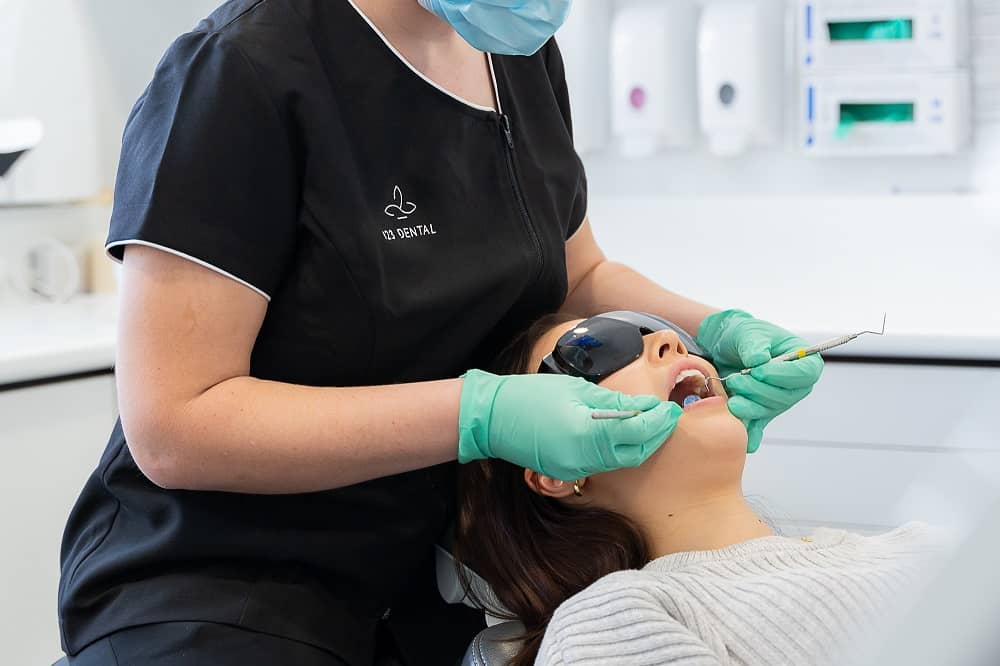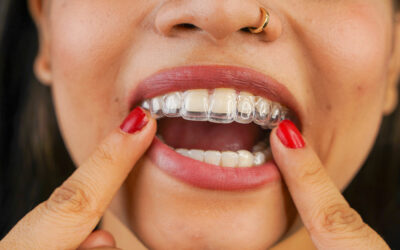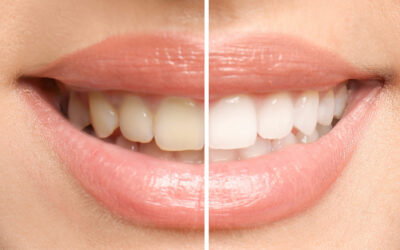Have you ever experienced a sudden, sharp pain when biting down on cold, hot, sweet, or sour foods? This painful, annoying sensation is known as tooth sensitivity.
Tooth sensitivity can impact your quality of life by interfering with routine activities including brushing, drinking, and eating.
In this article, we will cover what causes tooth sensitivity, when to talk to your dentist about tooth sensitivity, and tips for managing and preventing tooth sensitivity.
What Is Tooth Sensitivity?
Tooth sensitivity occurs due to the deterioration of the tooth structure. Dentine, the material that makes up the inside of the tooth, houses microscopic tubules that encompass numerous miniature nerve endings.
When the enamel, the outer layer that protects the dentine located within the crown, is depleted, the nerve endings are exposed. When these nerve endings are stimulated, the result is the uncomfortable, sharp, sudden pain associated with teeth sensitivity.
Tooth sensitivity can manifest as temporary or chronic, and can affect multiple teeth or a single tooth.

What Are the Causes of Tooth Sensitivity?
The possible causes of tooth sensitivity include tooth decay, improper brushing, enamel damage, tooth trauma, dental treatments, gum disease, and more.
It is crucial to identify the cause of tooth sensitivity as it helps determine the ideal remedy for the condition.
Here is a closer look at some of the most common causes of tooth sensitivity:
- Tooth Decay
Poor oral hygiene and dental decay can lead to damaged enamel and exposed dentine, putting you at a high risk of tooth sensitivity.
- Hard-Bristled Toothbrushes
Dental experts frequently recommend the use of soft-bristled toothbrushes for regular brushing. Research shows that soft bristles are unlikely to cause damage to the enamel, making them a safe and effective way to help prevent tooth sensitivity.
- Teeth Whitening Products and Procedures
Teeth whitening has been a breakthrough in improving the beauty of teeth and boosting self-confidence. However, dental professionals reiterate that the overuse of teeth whitening products is detrimental to the integrity of teeth.
Many teeth whitening agents and treatments contain harsh chemicals meant to remove stains. Some of the harsh chemicals are capable of deteriorating the enamel and leading to tooth sensitivity.
If you are uncertain about the side effects of teeth whitening, consult your dental professional. If you do choose to whiten your teeth, use oral products designed for sensitive teeth following whitening treatments.
- Dry Mouth
Dry mouth can cause a variety of side effects in the mouth, including tooth sensitivity. Dry mouth can be a result of genetics, medical procedures, excess alcohol consumption, alcohol-based mouthwashes, excessive caffeine intake, and certain medications. If you are experiencing dry mouth, talk to your dentist about treatment options.
- Gum Disease
Gum disease or periodontal disease compromises gum tissue through inflammation. Subsequently, the inflamed tissue is unable to protect the roots, resulting in sensitive teeth. The disease progresses and deteriorates the bone and other supportive tissues, causing exposure of teeth roots.
Also, gum recession resulting from ageing or smoking can lead to the exposure of the teeth roots. For treatment, a dentist may need to perform a deep cleaning of the teeth. The procedure, known as scaling or planing, clears away plaque and tartar below the gum line. In some circumstances, there is a need for surgery.
- Dental Procedures
It is possible to experience tooth sensitivity after professional dental procedures, including cleaning, crown replacement, root planing, and other restoration procedures performed on teeth.
However, for such sensitivity, the pain usually dissipates within four to six weeks. If you are experiencing persistent tooth sensitivity after a dental procedure, be sure to let your dentist know.
- Irregular Flossing
Daily flossing is a crucial part of a good oral hygiene routine. Flossing is effective in reducing the buildup of plaque that often causes gum disease, tooth sensitivity, and receding gums.
- Consuming High-Acidity Foods
Foods that contain high levels of acid have the potential to erode enamel and thus exacerbate tooth sensitivity. Therefore, it is advisable to avoid the regular consumption of such foods.
Instead, opt for tooth-friendly alternatives such as milk, cheese, plain yoghurt, and high-fibre fruits and vegetables. After consuming acidic foods, it is advisable to wait for about an hour before brushing. If you do consume acidic beverages, it is safer to use a straw to minimise the likelihood of the acidic food contacting the teeth.
- Aggressive Brushing
While poor oral hygiene can create an overly acidic mouth that is prone to decay, it is important to use proper technique and be gentle when brushing.
Aggressive brushing, especially with a hard-bristled toothbrush, can damage the enamel. This damage can expose tooth roots and lead to sensitivity. Overbrushing can also lead to gum recession.
- Teeth Grinding
Teeth grinding, also known as bruxism, damages the outer layer of the teeth and can expose the inner layer of the teeth, leading to sensitivity. Dentists recommend a bite splint to protect teeth against grinding and clenching.
Ways to Decrease Tooth Sensitivity
Here are some ways to help treat tooth sensitivity:
- Rinse With Water After Meals – Rinsing your mouth with water several times a day, especially after consuming highly acidic or sugary foods, can provide numerous benefits. Rinsing with water helps clear away food debris, reduces plaque development, lowers the pH in the mouth, and helps prevent dry mouth.
- Ask Your Dentist About Fluoride Treatments – Fluoride can help protect and even rebuild tooth enamel. Ask your dentist if fluoride treatments or fluoride toothpaste are right for you.
- Visit Your Dentist Regularly – See your dentist regularly for general dental checkups and be sure to mention any sensitivity issues you are experiencing. Your dentist can perform a thorough exam to pinpoint any underlying issues that are causing tooth sensitivity.
- Use a Toothpaste Specifically Formulated for Sensitive Teeth – Toothpastes for sensitive teeth work by forming a barrier that protects the nerves inside your tooth. Ask your dentist if a sensitive toothpaste is right for you.
- Limit Whitening Sessions – Keep your whitening sessions short and make sure to follow instructions regarding usage and frequency. Ask your dentist for recommendations on how often you can safely whiten your teeth. Also, avoid whitening strips as these are especially concentrated and more likely to aggravate sensitivity
- Stay Hydrated – Along with benefiting your overall health, staying hydrated is important for preventing dry mouth.
- Use an Alcohol-Free Mouthwash – Some mouthwashes have a high alcohol content and acids that can make tooth sensitivity worse. Ask your dentist for mouthwash recommendations for sensitive teeth.
- Reduce Caffeine Consumption – Coffee, tea, and soda decrease saliva production, making you more susceptible to dry mouth.
- Brush Carefully and Gently – Brushing twice a day is an important part of supporting good oral health. However, if you brush too often or with too much pressure, you may be doing more harm than good. Overbrushing can damage the gums and wear away enamel, putting you at risk of tooth sensitivity. Use gentle pressure and a soft-bristled toothbrush to clean your teeth twice a day.
- Floss Daily – Flossing every day helps clear away any hard to reach debris in the mouth that brushing can miss. Daily flossing is one of the best ways to prevent the build-up of plaque and keep your mouth, gums, and teeth healthy.
- Go Orange – Orange vegetables such as carrots and sweet potatoes are brimming with Vitamin A. Along with supporting healthy skin and eyes, vitamin A can also help reduce tooth sensitivity.
- Wear a Bite Splint – If you grind your teeth, make sure to ask your dentist about a bite splint to manage teeth grinding.
- Don’t Ignore a Cracked Tooth – If you notice a broken or cracked tooth, contact your dentist immediately to address and repair the damage.
What Are the Worst Foods for Sensitive Teeth?
Very hot or cold foods and beverages are well known for worsening tooth sensitivity. Highly acidic or sweet foods can also make tooth sensitivity worse.
If you have sensitive teeth, avoid or limit your intake of the following foods and beverages:
- Coffee
- Ice Cream
- Red wine
- Vinegar-based foods such as olives or pickles
- Juice
- Soda
- Sweet treats such as desserts, cookies, candies, pies, etc.
- Alcohol
- Citrus fruits
- Tomatoes
- Tea
- Non-food objects such as ice cubes
What Are the Best Foods for Sensitive Teeth?
The right foods can help manage or reduce teeth sensitivity. The best foods for sensitive teeth include:
- Leafy greens such as spinach and kale
- Broccoli
- Dairy products (their high calcium levels help strengthen tooth enamel)
- High-quality protein
- Water
- Crunchy vegetables such as celery and carrots (crunchy veggies stimulate saliva production)
- High-fibre foods
- Apples
- Almonds
- Eggs
- Fatty fish
Do You Have Concerns About Tooth Sensitivity?
Consulting a dental professional is essential to identify the precise cause of tooth sensitivity. By pinpointing the root cause of sensitivity issues, your dentist can advise you on the best route of treatment.
123 Dental is here for all of your oral health needs, including tooth sensitivity. If you are experiencing tooth sensitivity, please contact us. Our team is happy to answer your questions and set up a consultation to get to the bottom of your tooth sensitivity.







 Hi, you’re chatting with Chloe. If you could please fill out all your details below, I will be in contact with you shortly.
Hi, you’re chatting with Chloe. If you could please fill out all your details below, I will be in contact with you shortly.